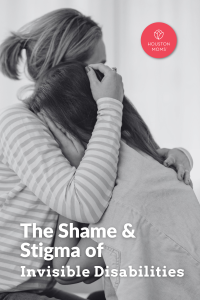Is there a more complicated, paradoxical role than being a mother? I can’t imagine any other experience in life that is filled with so much joy and wonder, yet at the same time, so much pain.
It wasn’t supposed to be this way. Three kids, three different diagnoses. Three sets of challenges with varying degrees of visibility and impacts on our everyday family life.
For years, I’ve been drowning, gasping for air, but doing it with a mask on. A mask of competency; maybe not making it all look easy, but at least doable. Hiding behind a smile. Hiding behind cute social media pictures and quirky stories about my kids. Hiding behind getting up every morning and just getting it all done, no matter how hard. Saying I love you to all my children at the end of the day, and then falling into bed, demoralized and exhausted.
Because this is what moms do- we just do what needs to be done, no matter how afraid we are that we are one crisis away from completely falling apart.
 Invisible Disabilities are Sometimes the Hardest
Invisible Disabilities are Sometimes the Hardest
People see my oldest in his wheelchair, with various medical devices hanging from its arms, either keeping him alive or waiting to save his life should he need them. And it’s easy for them to put my son in that disability box, to accept that his challenges are beyond his control. No one blames him or blames me, and I don’t blame myself.
But my other two kids- their disabilities are invisible, at least physically. It’s harder for people to accept that a child is disabled when it manifests as undesirable behaviors, mental health issues, or learning problems. Often, these are explained away as bad attitudes, laziness, or bad parenting.
I did it too- for almost 10 years, I failed to recognize some of the struggles in our home specifically surrounding one of our children were not a result of my parenting, or her conscious choices, but an actual medical issue. A medical issue that causes the brain to develop and work differently. A medical issue that can be treated, in part with medication.
Just like when we were given a name to describe my oldest’s collection of symptoms, this particular diagnosis brought me a hurricane of paradoxical emotions. This time around, it was relief, anger, sadness, and shame. We finally had an explanation. But the why…that was harder to accept. Why us? Why her? Why can’t anything just be easy?
Shame and Stigma
I’ve lived with a lot of shame for a decade- shame that I was just doing it wrong. I wasn’t strict enough, or patient enough, and let her get away with too much. And I know I’ve shamed her- yes, you CAN help it; just calm down; I’ve asked you to do that three times already…STOP IT.
But shame doesn’t do anything but destroy relationships. It never really changes behavior. But what repairs relationships and changes behavior? Love. Empathy. Vulnerability. Self-compassion. Professional help. Respite. Medication.
There is so much stigma attached to treating invisible disabilities, especially with medication. Oh, that’s way over-diagnosed. It’s not a real disorder. She needs discipline, not medication. That’s just how kids are. Get her off screens and outside, and that will “fix” her.
But here’s the thing. No one questions the powerful medications my older son is on to prevent seizures– to CONTROL THE WAY HIS BRAIN BEHAVES. And yet, my more “typical” child, and I as her parent, do not get the same allowances for the powerful medication she takes to CONTROL THE WAY HER BRAIN BEHAVES. It’s disorienting and infuriating.
Lead with Empathy and Compassion
We’ve all been taught to have empathy and compassion for mothers of kids with visible health challenges. I’ve lived it and received it. But as a society, we need to learn that same empathy and compassion for moms of struggling older kids who don’t “look” disabled.
Invisible disabilities are very real, and often the worst and hardest parts happen behind closed doors. The best thing you can do when a mom tells you her child is struggling and needs medication or some other interventions: BELIEVE HER. Don’t question a medical or mental health diagnosis, or whether the child really needs that medication or school accommodations. It is not your job, nor your business, to determine the best way to parent someone else’s child.
Stop using the names of real diagnoses to flippantly describe someone’s behavior. No, your spouse is not “OCD” because he insists on checking all the locks at night. No, you are not “ADHD” because you got distracted and forgot to follow up with a friend or “Dyslexic” because you accidently switched around some numbers when writing them down. Your teenager isn’t “spastic” and no one, not ever, is “retarded”. The incorrect and ableist use of these terms just reinforces the stigma behind the actual, real struggles of children and adults with these diagnoses.
My hope is that all my children grow up surrounded by people who love and accept them as the unique humans they are. Their disabilities certainly shape the way they navigate the world, but they do not define their worth. And I continue to believe, by being raw and honest about the realities of parenting children with disabilities, that I’m making a small difference in changing the narrative surrounding these challenges.
Because shame and stigma are no longer invited into our home, and I hope they aren’t invited into yours.













